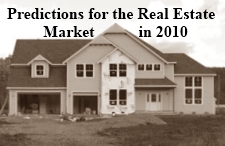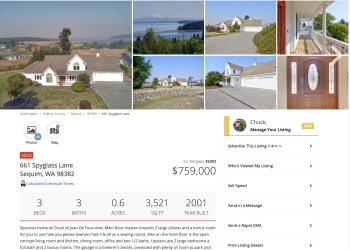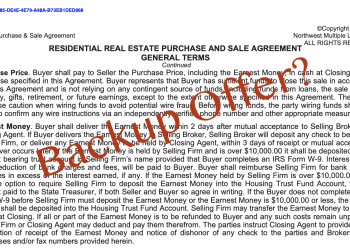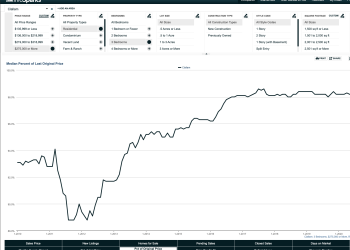 What will happen in the real estate market in 2010? Not too many are stepping out to predict with any specificity what the real estate market will do in 2010. There are some so-called predictions, but they are about as predictive as a fortune cookie. Did you ever notice that the fortune in the cookie could be applied to anyone on the face of the earth in any century? That’s why the fortune cookie business is so stable. The cookies can be made in any century and they’re still good.
What will happen in the real estate market in 2010? Not too many are stepping out to predict with any specificity what the real estate market will do in 2010. There are some so-called predictions, but they are about as predictive as a fortune cookie. Did you ever notice that the fortune in the cookie could be applied to anyone on the face of the earth in any century? That’s why the fortune cookie business is so stable. The cookies can be made in any century and they’re still good.
U.S. News and World Report writer Luke Mullins baked this kind of generic fortune cookie recently in an article entitled, 10 Things to Know About Real Estate in 2010. In all fairness to Luke Mullins, it is a well written article, and I assume he would argue he wasn’t trying to be a prophet. Here are the 10 no-brainers he offered for the real estate market in 2010.
- Prices will bottom out.
- Mortgage delinquencies will be up.
- Foreclosures will increase.
- Mortgage rates will rise.
- The buyer’s market will continue.
- Obama’s loan modification plan could be modified.
- FHA lending standards may increase.
- The buyer tax credit remains.
- Markets will vary by region.
- Mobile apps will help people.
Is anyone else short of breath with these stunning revelations? Me neither. Forgive me for my attempt at humorous sarcasm, but these are hardly predictions about the real estate market in 2010. These are 10 of the most obvious no-brainers I’ve read in a long time. I suppose I could have written about this coming year with something like this, “Some people will die. Some people will live. Some people will become ill. The world will continue to rotate on its axis. Hearst News will struggle with the loss of advertising revenue.” Okay, tell us something we don’t know.
Now that I’ve had some fun at Luke Mullins’ expense, I will boldly go where some men have already gone, and make my predictions for the real estate market in 2010. My speculation about the future of real estate is nothing but my own opinion, and subject to being right, partially right, partially wrong, or totally wrong. But here it is.
Predictions for the Real Estate Market in 2010
The real estate market will become more segmented in 2010. The real estate market for buyers of single family homes will no longer be one big market, like a smorgasbord with a huge inventory where buyers can pick and choose any color, shape, or size home. Instead, we will see the beginning of a changing real estate landscape that is segmented into different smaller markets, and buyers will focus on the market they want and ignore the rest. The market segments will include homes currently in default (possible short sales), homes already foreclosed on, homes for sale not in distress (listed with agents and FSBOs), new construction, and buyers will be making a distinction between older homes and newer homes that are more energy efficient, greener, and less likely to have health issues (excessive moisture, mold) and less likely to be a fire hazard. Buyers are beginning to shop more and more within their segment, and that trend will continue through 2010.
Buyers will become far more astute in searching for and finding their homes. The days of consumers relying totally upon their real estate agent for everything are over. Buyers are now using the Internet to search for their ideal home and to do their due diligence on real estate agents. Buyers are taking control of the process like never before, and the Internet is empowering them. This will become more obvious throughout 2010 and beyond.
Interest rates will begin an assent most notably in March of 2010. This is a guess, but not without substance. Don’t look to Bernanke or the Feds to delicately manipulate monetary and fiscal policy to peg interest rates artificially low for the year. There are too many market forces that will push interest rates up, and it is unlikely we will see them at these historical low points again. This should not be taken to mean that interest rates won’t increase between now and March, because they will. But the bigger move will begin in March.
The real estate brokerage business will see the most dramatic changes in its history. There is a dramatic paradigm shift occurring in the real estate brokerage business, which is unfolding behind the scenes. It won’t be so visible to the public in 2010, but watch for major changes in large brokerages, marketing, and how buyers and sellers work with agents. Hint: we are moving away from large brick and mortar brokerages to virtual brokerages that better serve buyers and sellers, and reduce the excessive overhead of traditional brokerages. Territorial boundaries for brokers will begin to crumble. The Internet knows no boundaries.
Home sellers will have to re-educate themselves on how to sell a home. What used to work to sell a home, (i.e. running an ad in the Sunday newspaper and maybe in a real estate magazine, and placing it in the multiple listing service with an agent) will no longer be the key to selling real estate. Home owners will have to educate themselves, because the real estate industry itself is entrenched in traditional brokerage and traditional advertising. Home owners will have to become more engaged in the process, and that will involve research and education on their part, including doing their due diligence on what kind of brokerage and agent they will work with.
Home prices will begin a slow assent in June of 2010. The return to a strong healthy real estate market is going to be a long slow journey, but the assent will begin this summer. It will not be a steady upward appreciation as we have had in many cycles before. Instead we will see appreciation that is almost imperceptible at the time, and there will be months at a time when prices stall before again beginning their assent. In the weaker real estate markets around the country, prices will continue to slide. Detroit and other local markets that are devastated by corporate shut downs or layoffs will suffer in their unique markets for years. Markets like we have on the Olympic Peninsula, Sequim and Port Angeles, are more stable markets and will return to health slowly with less instability. Gradual appreciation will start in June of 2010 and subject to periods of stagnation that last a few months at a time, home prices will gradually appreciate, especially in Sequim.
Home prices will stall for six months beginning in October of 2010. The U.S. economy will suffer from growth pains as it works through very complex economic gyrations, and that will cause some uncertainty in the real estate market that will translate into several plateaus where prices will stall out for a time before increasing. We’ll see this in the fall of 2010 until early spring of 2011.
Large home builders will struggle to survive, but small custom home builders who were financially strong enough to get through the recession will be building with more volume starting in July of 2010. The big builders in major metropolitan areas who built thousands of houses on pure speculation will not see the quick return of their profitable business model in 2010, and maybe not in 2011 or 2012 either. But small to medium sized home builders who can build a home under contract will see some hope as clients start to sign contracts in July of 2010, not in big numbers, but enough to sustain a small business. There will still be a large inventory of homes in distress and foreclosed, but that market segment will not interest retirees who want to build their own dream home on a lot with a view of their choice.
High unemployment and corporate bankruptcies will continue throughout 2010. There will be no smooth sailing in 2010, because the return of a strong economy will still be threatened by corporate bankruptcies and high unemployment around the country. The strength of our small and large businesses will depend greatly upon many exogenous variables, which could change the game plan for all of us. For example, if foreign investors (i.e. Chinese) stop purchasing U.S. Treasuries, the U.S. Government could default on its debt, which would have extraordinary implications for all of us. Also we have never had to rebuild an entire economy under the burden of so much growing national debt. This will be a very unpredictable year for professional economists as long as our government continues with its radical socialist agenda.
Wall Street will have several false starts in 2010. The stock market will have more false starts in 2010 than in any previous year most of us can remember. There’s nothing more that Wall Street wants, that investors want, and that the news media wants than to be able to proclaim that the market has returned. But there are too many cracks in the foundation. The self-fulfilling prophesy of hope will cause the markets to climb enthusiastically several times in 2010, only to fall back and disappoint. This negates the return of a strong real estate market.
Gold, commodities, options, and the futures market will be hyper-speculative and 95% of investors will transfer their money to the other 5%. There will be wild speculation and greed in the riskiest of investments in 2010 as the market sends false signals. This kind of uncertainty causes buyers to go into holding patterns, and that will be true for home buyers, especially retirees. Uncertainty and lack of confidence tends to continue the problem.
As bleak as these predictions are for 2010, real estate (single family homes) will be the most stable investment for the year. The national economy, Wall Street, and speculative instruments all are connected with the real estate market in various direct and indirect ways. The stability and strength of the mortgage market, the banking industry, the money supply, interest rates, federal debt, all of these will effect (hinder) the real estate market in 2010. But the real estate market, particularly single family homes, will show more stability and appreciation than any other sector of our economy. One of the main reasons for this will be that investors and retirees will feel their money is safer in their own home than anywhere else. That will be true in 2010 and beyond.
Last Updated on September 2, 2019 by Chuck Marunde
































